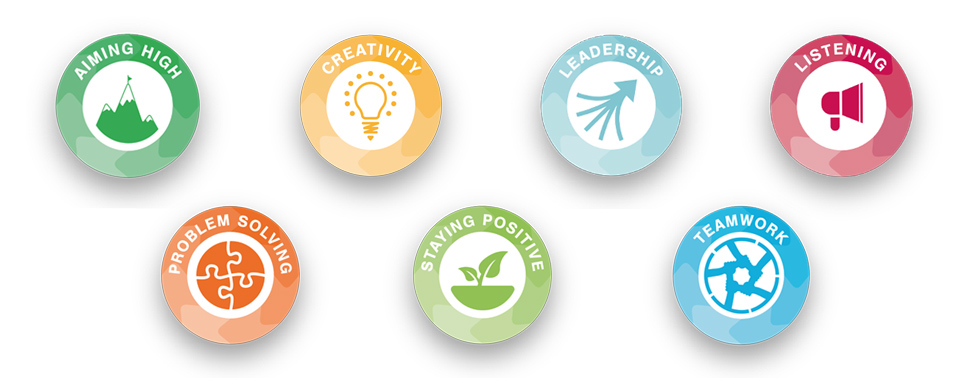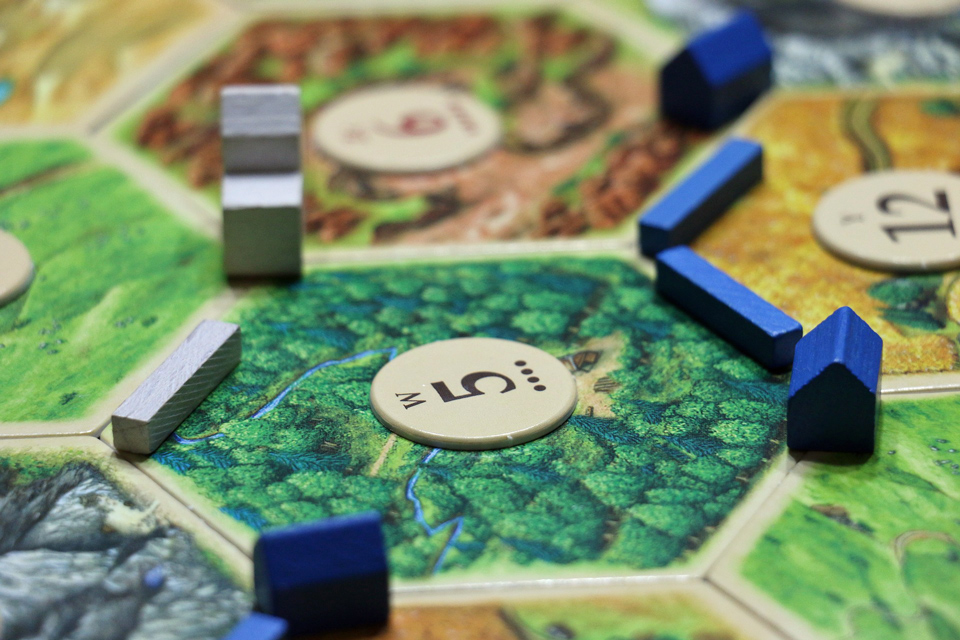Despite the millions of apps and video games that invade our everyday lives, board games (also known as tabletop games) are making a comeback to the family table. If what comes to mind when you hear the phrase family board games is Monopoly or Scrabble, then think again, there are now a myriad of themes with enticing illustrations and complex mechanics to spice up your tabletop gaming experience. This new generation of games offers parents opportunities to bond with their children and reclaim time away from screens whilst building key 21st century thinking skills in an entertaining way.
Board games offer multiple ways to develop a number of thinking skills. For example, problem solving, logical thinking and decision making are developed through:
- planning within a restrictive amount of choice
- management and prioritising of limited resources
- thinking ahead of the current turn
- predicting what others may do
- evaluating the advantages and disadvantages of different moves
- staying ahead while remembering and adhering to the rules of the game
- flexibility in playing the same game differently each time.
Another important benefit derived from playing board games is the unique opportunity that they offer to process sets of information simultaneously. This creates regular practice in working memory and information processing. These cognitive skills have been shown to play a crucial role in academic performance as well as in the everyday life of all adults. They involve being able to remember key facts about the issue at hand, while mentally comparing and contrasting options or propositions, then organising or prioritising these key facts to produce a response, which may be verbal or by means of a chosen behaviour or action. The more variables the child can manipulate at once, the higher the probability that they will choose an optimal resolution.
Some introductory games that could be used by your family to develop these skills, include:
- Alhambra – Create your own Alhambra complex, buying gardens, pavilions and other structures, while building the longest garden wall. The more of each structure you have compared to other players, the more points you get, and if you are efficient with the use of your money, you get rewarded with another turn.
- Azul – Compete to get tiles from suppliers for your Portuguese mosaic grid. The order in which you complete it will determine your points, but wasted supplies will cost you, and you can’t repeat a pattern within a column or row. For an added level of complexity see Azul: Summer Pavilion.
- Carcassonne, like Catan, has been around for a long time, but their simple rules make them good entry games for all ages. In Carcassonne, tiles are placed to create the board, and the player has to decide whether and which choice of worker to place; some will get you points for the tiles around it or the longest farm area. In Catan the player creates their own settlement, building houses and roads, for which resource cards (wood, grain, brick, sheep and stone) are needed.
- Sagrada – Each player builds a stained-glass window by building up a grid of dice on their player board. Each board has some restrictions on which colour and die value can be placed, with same colour or value not being allowed next to each other. Special cards allow a player to break a rule, and individual goal cards give additional points for those who achieve them.
- One Night Ultimate Werewolf – This is a fast-paced game of deceit, where the town people need to catch the werewolf. With each player having a hidden role, trying to discover who is the werewolf or trying to conceal that you are, takes wit and quick thinking.
- 7 Wonders – As the leader of one of the 7 great cities of the Ancient World, you need to gather basic resources to develop commercial routes and affirm military supremacy. A set of cards is dealt in each of the three rounds, the player takes one and passes the rest to an adjacent player. Then, players play their one card simultaneously, paying or taking resources to place them. This is repeated until all cards have been used. After each of the three rounds, players get points for their buildings and military strength as compared to immediate neighbours.
- Between Cities – You work with the player on your left to design the heart of one city (playing a factory, shop, park, landmark or house), and with the player on your right to design the heart of another city. On each turn you select two tiles from a hand, reveal them, then work with your partners separately to place one of those tiles into each of your two cities before passing the remaining hand of tiles around the table. The tricky bit is that the winner is the player whose lowest scoring city has the higher score!
- The Quacks of Quedlinburg – Be a quack doctor creating secret brews. Each player has a bag of ingredients chips and, during each round, they simultaneously draw chips to place in their pot. The higher the value of the chip, the further it can be placed and the more coins received for ingredients. However, if you push your luck and get too many cherry bombs, your pot will explode.
Other skills can also be developed through board games; for example, some games train social skills like theory of mind, as players learn to predict how others will react or have to consider another player’s interpretation of a given picture (e.g. Dixit, Mysterium or Codenames). In other games, the whole family play as a team, developing team-working skills, effective communication and collaborative problem solving, as players present and discuss their ideas for best movement for the whole team (e.g. Forbidden Desert, Subterra, or Pandemic). Yet other games are highly creative, they require players to imagine unique scenarios, characters or weapons and develop flexibility, as each game requires a novel way of thinking and making points (e.g. Dungeons & Dragons, D&D; or Mice and Mystics).
Card games often have easier instructions to follow and can be used to play when short of time, going on holiday (they are small and easy to pack) or when you want to start introducing these skills for the very first time. Some games include: Hanabi (a cooperative game where you can see everyone’s cards but yours!); For Sale (get into real estate by bidding for buildings to later sell at the best profit); Splendor (become a Renaissance merchant and collect gems to buy mines, factories and shops, if you get rich enough, a noble visitor will bring extra points); Love Letter (a game of deduction where you have to secretly deliver your letter to the princess while deflecting those of others); Bohnanza (earn money by planting fields of sets of beans and harvesting them. You will need to trade and make deals with your opponents to win the game, as you can’t rearrange your hand of cards and you only have a few fields); and Century: Spice Road (players are caravan leaders who travel the silk road to deliver spices to the far reaches of the continent for fame and glory).
Some games are highly thematic and immerse you in a theme of choice. These include Wingspan (create a beautifully illustrated bird wildlife reserve); Viticulture (wine making at its best); Photosynthesis (plant trees in the best spots to collect sunshine and create shadows to slow down your opponents); Takenoko (tend a bamboo garden for the royal panda by cultivating and irrigating a colourful garden); Sherlock Holmes Consulting Detective (no board, this time a Victorian London map, newspaper cuttings, and interviews with suspects will have to be enough for you to solve the crime); and Harry Potter: Hogwarts Battle (a cooperative game set on JK Rowling’s wizardry world).
Board games can also be used with a subject-centred approach to increase your child’s ability and knowledge of numeracy (e.g. Times Square, Prime Climb); vocabulary (Taboo Kids vs Parents, Scattergories); creative writing (It’s Just a Theory, Snake Oil); science (Cytosis, Evolution); coding (RoboRally, CodingFarmers); and the humanities (Planet, Ticket to Ride, Nippon Rails, Medici, Teotihuacan, The Downfall of Pompeii, History of the World, Wars of the Roses: Lancaster vs. York, Battle of Britain); and art (Bruxelles 1893, Tokaido, Kanagawa, The Gallerist). Because young people are having fun, they learn faster and are willing to engage in the many repetitions that will allow information to stick. However, testing your child or forcing them to play a game would be counterproductive. For more games in these areas here are some of our favourite lists about maths, science or history games:
- https://thejohnfox.com/2017/01/15-boardgames-help-writers/
- https://www.fluentu.com/blog/english/board-games-to-learn-english/
- https://blog.mindresearch.org/blog/big-list-mathematical-board-games
- https://boardgamegeek.com/geeklist/206920/favourite-accurate-science-games.
If you are not used to playing board games as a family, start with card games or games that involve nonverbal skills, such as Tsuro, Ingenious, Set Game, Swish, Qwirkle, Patchwork, Doodle Quest, Blokus or Tangoes. Some of these (e.g. Set, Swish) have junior versions to include a very young member of the family. You should be prepared to scaffold* young children, however, and they may need to first play the game with everyone’s hand open to view by all players. Parents and older siblings can help by verbalising their thinking process in order to model for the younger members of the family how to go about considering options and alternative moves. Another helpful tip to support younger children is to give older players a handicap. Depending on the game this could be, for example, getting fewer cards or actions, or allowing the younger player to take more actions. If the child is very young, three years old or so, there are games designed just for them. These are basic and won’t keep them entertained for long but could help them engage with the first steps of playing a board game (e.g. Little Orchard and Outfoxed, for a longer list see https://boardgamegeek.com/childrensgames/browse/boardgame).
For those who have children who hate losing, cooperative games can ease the frustration of losing against another player while simultaneously providing opportunities for the adults in the house to model a good sports attitude when losing in a game. Be aware that some people can take over cooperative games, repeatedly deciding moves for the whole team. To avoid this, allow each player to propose an idea to the active player, but leave it to the player taking the turn to decide the move, even if this means losing the game!
An excellent resource to accompany your gaming experience is the website Board Game Geek (https://boardgamegeek.com/), where you can find complete details about any game, such as recommended by age; by members and manufacturer; ranking among all members; best number of players to play a game; print outs of rules in case you lose or damage yours; gaming aids (like action options or round stages); alternative instructions (for example, a cooperative way to play Carcassonne); written and video reviews, ‘how to play’ videos and even full playthroughs. You can also keep track of your own collection there and, for adults, there is a forum to connect with the board game community. You can also look up your local Board Game Café and Tabletop group online, many of which are open to families.
If after reading this you are now thinking of throwing your traditional board games away, don’t! To name just a few: Scrabble builds vocabulary and teaches about spelling, Monopoly is great to teach children how to count money if they are allowed to be the bank, Uno has very simple rules that young children can learn and still be enjoyed by the whole family, and Yahtzee teaches about addition and decision making. So, even if you only have these in the house, it is still well worth getting the board out!
*Scaffolding is an education technique which enhances, encourages, and enables learning by starting with specific instructions, then gradually reducing support and using more open-ended questioning as prompts.
About the author: Andrea Anguera is the Potential Plus UK Senior Assessor and holds an MSc in the Psychology of Education and Child Development. She is the mother of two children with high learning potential.







